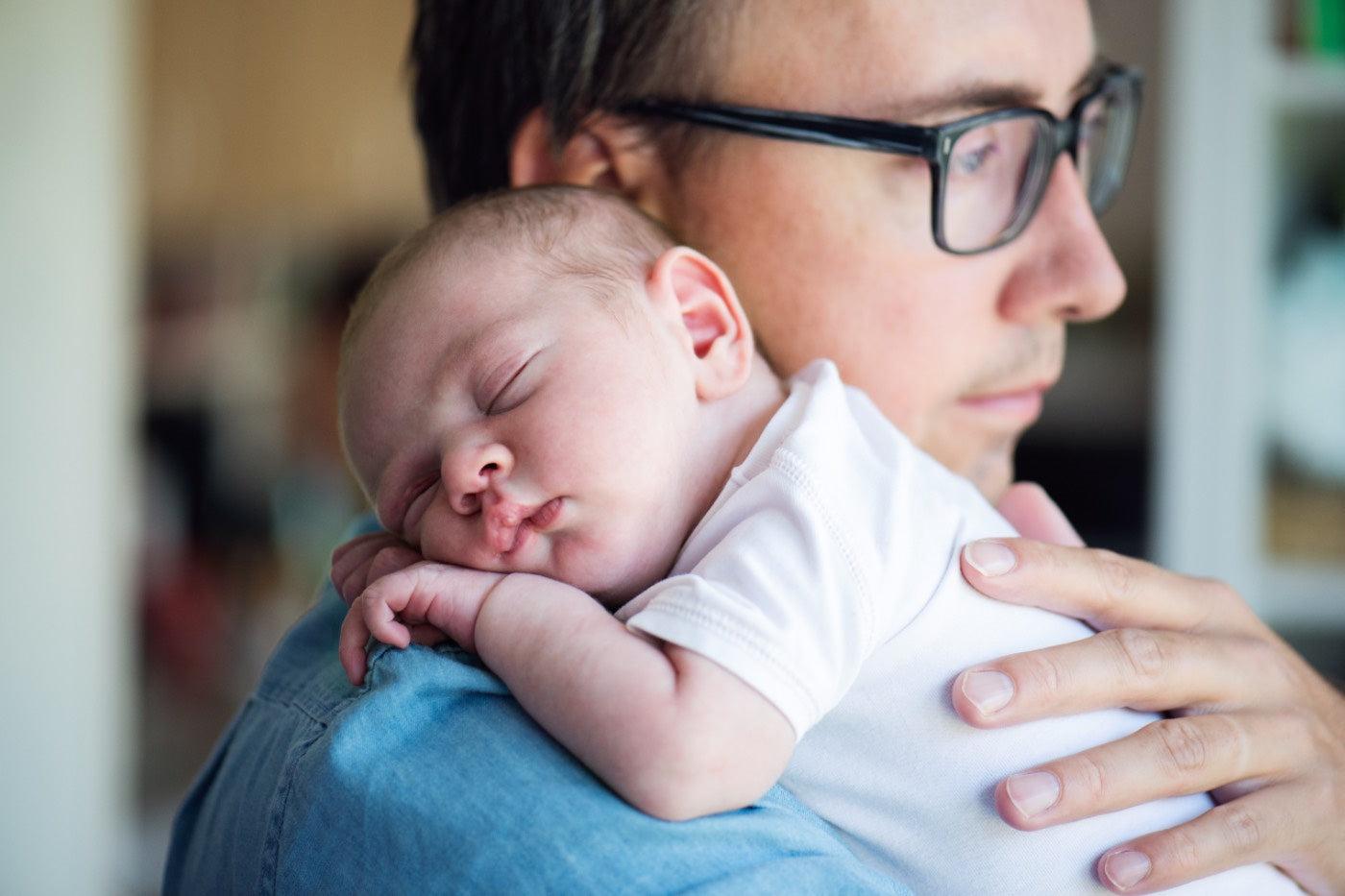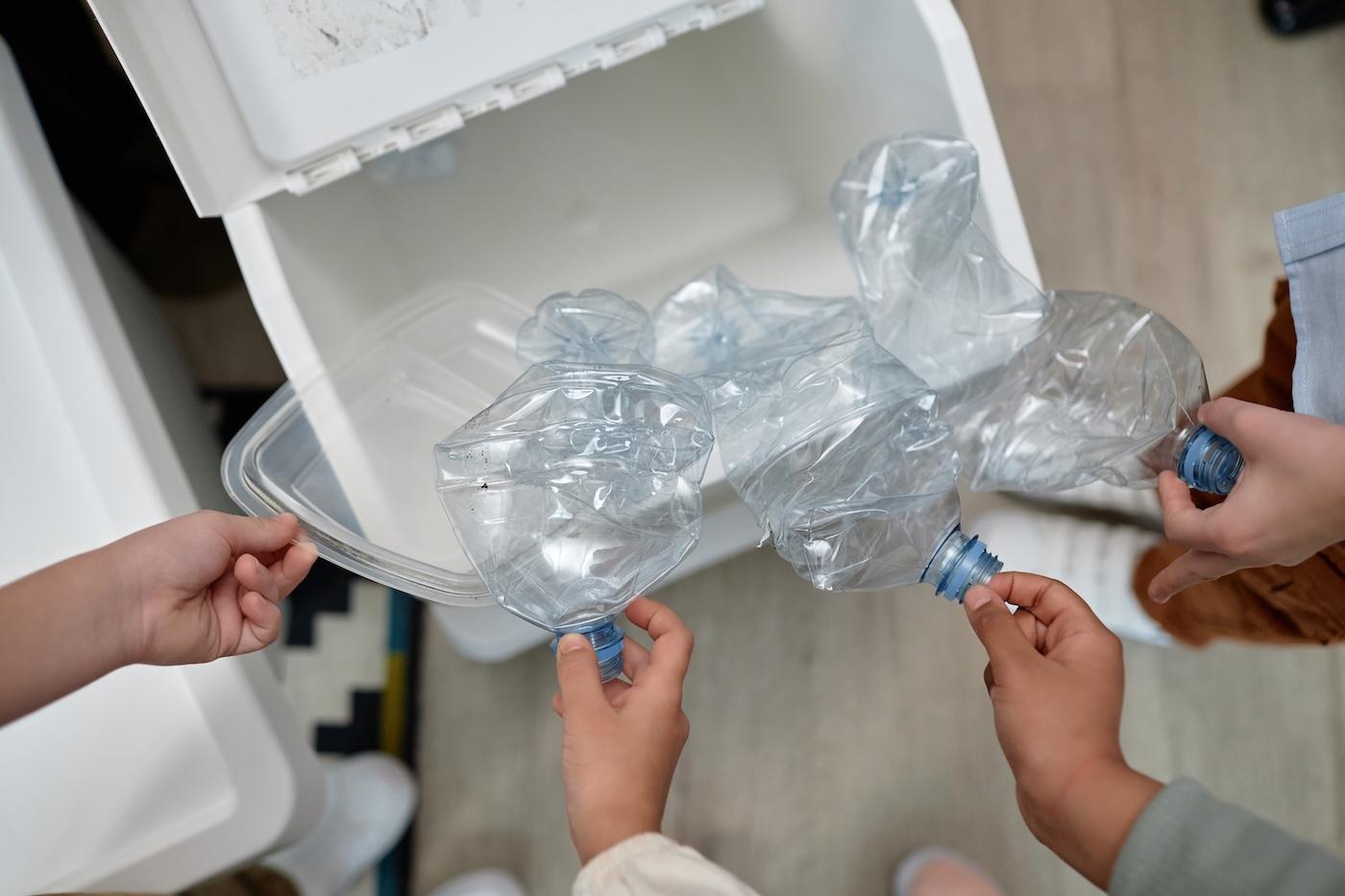PARENTS
The Science Behind Postpartum Depression in Dads
Yes, dads get postpartum depression, too. Learn what’s behind this new-father phenomenon.

Written by
Holly Pevzner

Postpartum depression is often attributed to the inevitable decline in pregnancy hormones that occurs after childbirth. But there’s a gaping hole in that theory: Fathers and same-sex supporting parents face nearly the same risks for postpartum depression as their pregnant partners, according to the American Academy of Pediatrics (AAP). In fact, research shows that about 1 in 10 dads experience PPD, with up to 25% reporting symptoms when babies are 3 to 6 months old. So, if pregnancy hormones aren’t to blame, what’s behind this wave of new-dad depression? Here, we examine the science of male postpartum depression and offer some research-backed ways to tackle the problem head on.
What is paternal depression?
While paternal perinatal depression (PPD) is not yet classified as an official diagnosable psychiatric disorder, it’s widely understood that PPD is when a new father experiences changes in mood and functionality within the first year after a baby is born, adopted, or added to the family. Paternal postnatal depression is sometimes referred to as paternal depression and male postpartum depression.
Signs and Symptoms of Postpartum Depression in Dads
The signs and symptoms of postpartum depression in dads are not exactly the same as what a new mom would experience. Here are some of the common signs that a new father is experiencing paternal depression:
-
Anger, outbursts, or aggressive behavior - Avoidance and loss of interest in family life
- Compulsive exercise
- Excessive internet or video games use
- Increased or decreased interest in work
- Irritability
- Low motivation
- Physical symptoms, like digestion issues or head, muscle, and stomach aches
- Poor concentration
- Sexual problems
- Social isolation from loved ones
- Substance use
- Uptick in impulsivity or risk-taking behaviors
What causes male postpartum depression?
There are a variety of biological, psychological, and situational reasons a new dad may experience depression after welcoming a new baby into the family. Beyond a personal or family history of depression or other mental illness, here are some factors that may cause postpartum depression in dads:
Dip in Hormones
We all know that moms-to-be experience an uptick in hormone production during pregnancy, and then a subsequent dip after birth. But you may now know that expecting and new dads deal with hormone fluctuations, too. Dads-to-be and new fathers often experience a decrease in testosterone, which is thought to help boost father-child bonds. However, low testosterone levels have also been directly linked to symptoms of depression in men.
Partner’s Postpartum Depression
Postpartum depression is, in a way, contagious. Maternal postpartum depression is the “strongest direct predictor” of paternal postpartum depression. Moreover, it’s been suggested that maternal depression increases the risk of paternal postpartum depression and anxiety by more than threefold. No matter who is suffering from postpartum depression, it can have a ripple effect, causing emotional strain for everyone close to a new baby.
Sleep Deprivation
Even though it seems like a no-brainer that a lack of sleep takes a toll on your mood, experts note that most new parents underestimate the pivotal role a lack of sleep can play in developing symptoms of depression. A 2021 report out of McGill University in Montreal found that poor perceived sleep quality among dads was clearly linked to an increase of severe depressive symptoms six months postpartum. This was especially true for first-time fathers. Sleeping and crying issues with the baby can also increase the odds that a new dad will experience postnatal depression. (Did you know SNOO is the only infant sleep system shown to increase sleep by up to 2 hours each night?)
Provider Pressure
A new dad can feel intense pressure around finance, career, and other stereotypical gender roles once they are in the position to provide for their growing family. This phenomenon is called masculine gender role stress (MGRS) and research in the American Journal of Men’s Health suggests it increases vulnerability to both anxiety and depression in fatherhood.
Lack of Support
Not having that all-important village to help with the baby impacts everyone! A 2021 meta-analysis found that fathers with low levels of perceived support were twice as likely to develop depression compared with dads who reported higher levels of support.
New-Parent Learning Curve
The new practical skills and coping skills that go hand-in-hand with becoming a dad can be overwhelming to say the least. Research shows that when new dads have what’s dubbed “low parenting self-efficacy” they’re far more susceptible to paternal postpartum depressive symptoms. Translation: When new dads lack confidence in their ability to be an effective dad, they’re at risk for new-dad depression. (Brush up on the 5 S’s for soothing babies before your baby arrives.)
Feeling Left Out
In general, moms tend to bond more quickly with their baby than dads. Studies indicate that most fathers enter parenthood expecting an immediate emotional bond with their newborns, but it can take up to two months for some dads to connect. That delay contrasted with the seemingly easy bond between mother and child can make new dads feel like a third wheel, which breeds depressive feelings. (Dads can learn simple ways to bond with Baby.)
The Problem with Suffering from Male Postpartum Depression in Silence
Dads tend to be especially reluctant to seek help for their postpartum depression. Many are too harried to prioritize their mental health. Their sleep deprivation can make it difficult to think clearly about their own needs. Plus, some dads and partners believe only the parent who gave birth deserves help. That’s unfortunate, because when dads ignore their own mental health needs their depressive symptoms can worsen—and impact the whole family.
On the flip side, reducing new-dad depression can increase emotionally sensitive, responsive parenting, attachment, and support new parents’ relationships, according to a report in the journal Pediatrics. And it can also buffer the potential negative impact on your kiddo. A 2023 study in JAMA Network Open found that the children of dads with postpartum paternal depression have a 42% higher chance of developing depression themselves. Another study indicates that babies of depressed dads are more likely to lash out in their preschool years. In fact, paternal depression when a baby is 1 year old was associated with up to 18% more aggressive and delinquent behaviors at age 5.
Treatment for Postpartum Depression in Dads
Postpartum depression in dads is understudied (and undiagnosed), which means there are no randomized, controlled trials designed to evaluate treatments for new dads suffering with PPD...yet! But there are strategies that can offer relief. Paternal postpartum depression treatment can include cognitive behavioral therapy (either in-person or online) and/or medication, such as selective serotonin reuptake inhibitors (SSRI). In addition, the following have shown to help ease symptoms as well:
-
Get adequate sleep for you—and your baby. - Build a support network through friends, family, postpartum doulas, and organizations such as Postpartum Support International.
- Engage in regular exercise.
- Practice yoga, mindfulness, and/or daily meditation
- Expose yourself to daily morning light. This has been shown to possibly reduce PPD symptoms and improve sleep.
- Take parental leave if you can; it’s been shown to have protective effects against depression.
- Flexible working hours may be protective as well.
- Have realistic infant sleep expectations—this has been shown to help buffer second-time dads from depression. (Dr. Harvey Karp on what newborn sleep really is like.)
More for Fathers:
- How Men’s Bodies Change When They Become Fathers
- Pierce Freelon on Why Dad Stories Matter
- Dads and Postpartum Depression—More Info
- Dads Get Real About Their Favorite Parenting Moments
- The Most Surprising Thing About Fatherhood Is...
***
REFERENCES
- American Academy of Pediatrics (AAP): Perinatal Depression in Partners: Can Both Parents Get the "Baby Blues?"
- Paternal depression: “The silent pandemic”. Industrial Psychiatry Journal. July - December 2022
- UnityPoint Health: Male Postpartum Depression
- Postpartum Depression in Men. Innovations in Clinical Neuroscience. May 2019
- Postpartum depression in mothers and fathers: a structural equation model. BMC Pregnancy and Childbirth. September 2020
- Risk factors for paternal perinatal depression and anxiety: A systematic review and meta-analysis. Psychology of Men & Masculinities. February 2020
- UTSouthwestern Medical Center: 1 in 10 dads experience postpartum depression, anxiety: How to spot the signs
- Investigating the link between sleep and postpartum depression in fathers utilizing subjective and objective sleep measures. Sleep Medicine: X. December 2021
- National Childbirth Trust (NCT): Postnatal depression in dads and co-parents: 10 things you should know
- Predictive Factors for Depression and Anxiety in Men During the Perinatal Period: A Mixed Methods Study. American Journal of Men’s Health. January - February 2022
- Risk factors for postpartum depressive symptoms among fathers: A systematic review and meta-analysis. Acta Obstetricia et Gynecologica Scandinavica. February 2021
- Cleveland Clinic: Yes, Postpartum Depression in Men Is Very Real
- Association of Women's Health, Obstetric and Neonatal Nurses: Father’s Day: A Father’s Bond with His Newborn Is Just as Important as a Mother’s Bond
- A Call to Action: Screening Fathers for Perinatal Depression. Pediatrics. January 2020
- Paternal Depression and Risk of Depression Among Offspring. JAMA Network Open. August 2023
- Paternal depression in the postpartum year and children’s behaviors at age 5 in an urban U.S. birth cohort. PLOS One. April 2024
- New Fathers’ Perinatal Depression and Anxiety—Treatment Options: An Integrative Review. American Journal of Men’s Health. July 2017
Disclaimer: The information on our site is NOT medical advice for any specific person or condition. It is only meant as general information. If you have any medical questions and concerns about your child or yourself, please contact your health provider.
SHARE THIS ARTICLE
MOST LOVED
Sleepytime Sidekicks
More on Parents
About Holly Pevzner
Holly Pevzner is Happiest Baby’s Staff Writer. She specializes in creating parenting, pregnancy, health, nutrition, and family travel content. Her work—including essays, columns, reported features, and more—has appeared in outlets such as EatingWell, Family Circle, Parents, Real Simple, and The Bump. Before becoming a full-time writer, Holly held senior staff positions at Prevention, Fitness, and Self magazines, covering medical health and psychology. She was also a contributing editor at Scholastic Parent & Child magazine and a regular kids-health columnist for Prevention and First For Women magazines. Holly lives in Los Angeles with her husband, two boys, and terrier mix.












